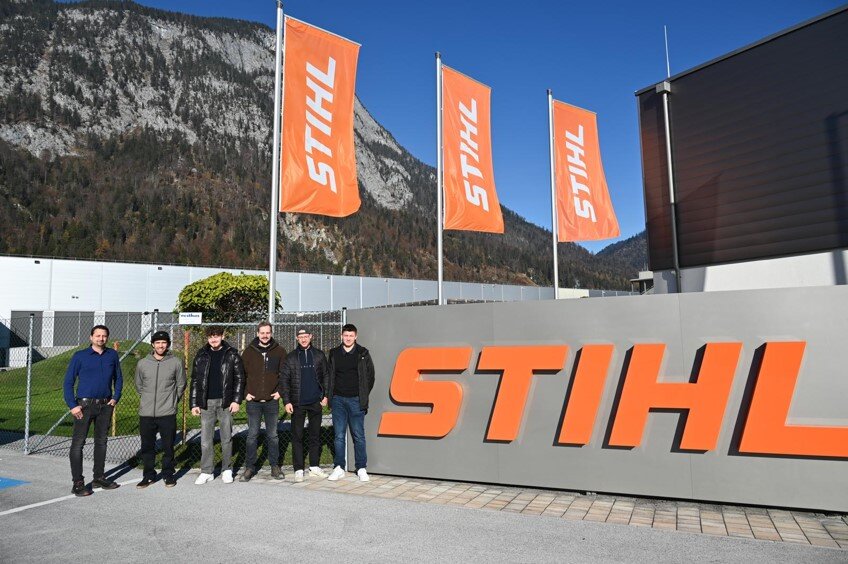Process analysis in shredder production at STIHL Tirol
- 14.05.2025
- Practical Project

The students and film professional from the eLearning Center at the Kufstein University of Applied Sciences setting up the camera with Mr. Buchegger, project manager at STIHL Tirol (left in the picture).
How do you optimize highly complex production processes? Students from the University of Applied Sciences Kufstein Tirol analyzed the production process for shredders at garden tool manufacturer STIHL Tirol – and not only gained valuable insights, but also identified specific areas for improvement.
Students of the bachelor's degree program in Industrial Engineering & Management at the University of Applied Sciences Kufstein Tirol carried out a comprehensive, video-based process recording on a chipper production line at STIHL Tirol as part of a practical project. Not only were the manufacturing processes documented in detail, but a complexity assessment was also carried out for the production staff in order to identify potential for optimization, primarily in automation and ergonomics.
STIHL TIROL AS A PARTNER FOR INNOVATIVE PRODUCTION ANALYSIS
STIHL Tirol, based in Langkampfen, is a leading manufacturer of ground-based and hand-held gardening and forestry equipment. As part of the internationally successful STIHL Group, the company is known for its innovative technologies and high quality standards. The company's shredders have been an essential part of its portfolio since its foundation. The continuous improvement process (CIP) is a high priority within the company. For this reason, the collaboration with the technical degree programs at the Kufstein University of Applied Sciences in Tyrol has been further strengthened and continued for this project.
PRACTICAL LEARNING AND VALUABLE INSIGHTS
During a five-month project phase, five students analyzed the production processes of the shredder assembly line. They were supported by the eLearning Center at the University of Applied Sciences Kufstein Tirol and received specific training on manufacturing processes, process representation, and time recording.
STIHL Tirol also provided training as part of the project support, and the company from Langkampfen helped the students prepare their presentations, thereby further improving not only the project results but also the students' learning success.
The process was recorded on video over the course of one day using the MTM (Methods-Time Measurement) methodology. This procedure breaks down workflows into the smallest possible movements and assigns standardized time values to them in order to assess efficiency and ergonomics. To obtain reliable data, at least five complete runs were recorded for each process step – known as assessable runs. These repetitions make it possible to analyze typical procedures and identify variations in execution. Three camera angles ensured that all ergonomic, mechanical, and organizational aspects of the assembly were recorded in detail.
After the video analysis, the results were compared with the existing internal documentation. Any deviations found were worked out and potential for optimization identified. The students then developed proposals for improving ergonomics and automation, including the use of a CAD program for assembly line planning. As STIHL Tirol already has very high manufacturing standards, the production management requested that the focus be placed on ergonomics and employee support. The concept was also assessed from a financial perspective and the payback period was evaluated. At the same time, it became apparent that the assembly processes are highly complex, which requires intensive training for employees.
EFFECTIVE COOPERATION AND SUSTAINABLE RESULTS
The cooperation between the students and STIHL Tirol was assessed as extremely positive by both sides. The open exchange enabled both partners to gain valuable insights.
WE LEARNED A LOT FROM THE PROJECT AND GAINED IN-DEPTH INSIGHT INTO PRODUCTION, QUALITY, AND EMPLOYEE RESPONSIBILITY AT STIHL TIROL. ABOVE ALL, WE GAINED A GREAT DEAL OF KNOWLEDGE THROUGH THE COACHING PROVIDED BY MR. BUCHEGGER AND THE FEEDBACK FROM THE OTHER PARTICIPANTS.
Members of the practical project
SUPPORT FROM THE E-LEARNING CENTER
The eLearning Center at the University of Applied Sciences Kufstein Tirol played a central role in the technical implementation of the project. It provided all the video equipment, supported the students throughout the day of filming, and took care of the synchronization and editing of the material. The aim is to use the videos created, as in the preliminary project for the iMOW mowing robot, as teaching material for future training courses. Follow-up projects are currently working on a comprehensive utilization concept.
LONG-TERM IMPACT AND FOLLOW-UP PROJECTS
The project provided valuable insights that are of great benefit to both STIHL Tirol and the students. Direct implementation is currently underway.
For students at the Kufstein University of Applied Sciences, the project represents valuable practical experience that will also be used in teaching. Future student groups on the degree programs in Industrial Engineering, ERP Systems & Business Process Management, and Smart Products & Solutions will benefit from the knowledge gained.
The close cooperation between STIHL Tirol and the Kufstein University of Applied Sciences will be continued and deepened with a follow-up project that is already in the works.
Links:
- Careers at STIHL Tirol |Website
- Industrial Engineering & Management | ft
